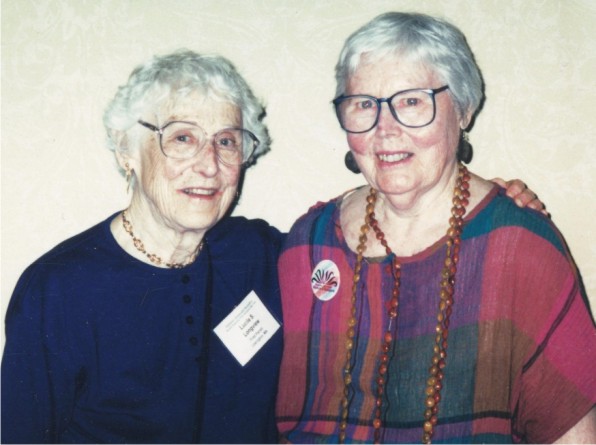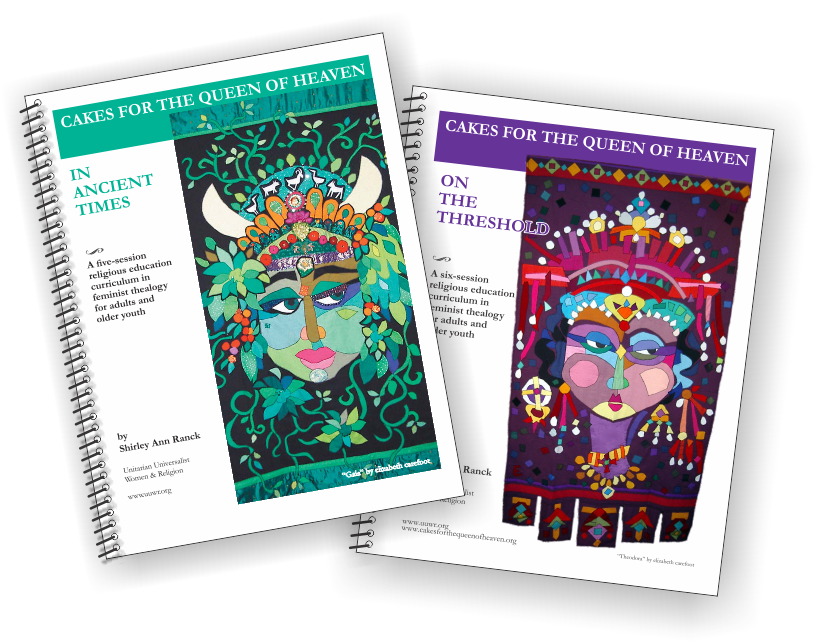“We don’t accomplish anything in this world alone…and whatever happens is the result of the whole tapestry of one’s life and all the weavings of individual threads from one to another that creates something.” Sandra Day O’Connor
 When a person dies, someone special who means something to me, either personally or by way of the news I learn about that particular person, I feel a commitment to carry on that person’s good memes.* Lucile Schuck Longview is such an influence in my life. She died last spring. This issue’s lead article, "Speaking our Truth: The Legacy of Lucile Longview" is Jane Flanagan’s tribute to Lucile. The article following Jane’s gives Lucile’s report to the International Association of Liberal Religious Women (IALRW) that I found in their archives. Lucile is a strong guiding force who, like Sandra Day O’Connor, was comfortable as a woman in a position of power. Lucile was looking for new answers from our UU religion. [in photo, left: Lucile Schuck Longview; right: Rosemary Matson]
When a person dies, someone special who means something to me, either personally or by way of the news I learn about that particular person, I feel a commitment to carry on that person’s good memes.* Lucile Schuck Longview is such an influence in my life. She died last spring. This issue’s lead article, "Speaking our Truth: The Legacy of Lucile Longview" is Jane Flanagan’s tribute to Lucile. The article following Jane’s gives Lucile’s report to the International Association of Liberal Religious Women (IALRW) that I found in their archives. Lucile is a strong guiding force who, like Sandra Day O’Connor, was comfortable as a woman in a position of power. Lucile was looking for new answers from our UU religion. [in photo, left: Lucile Schuck Longview; right: Rosemary Matson]
*What are memes? They are sparks of life that can bear the potential for liberation or destruction. They are linked to the human creative urge. A meme is a kind of sub-conscious awareness in our minds. An example comes from my husband’s experience as an inventor. He sometimes has memes come to his attention when he makes a new invention and then discovers his same idea has been invented at the same time in other parts of the world. Memes are sub-consciously contagious. Here are two books I’ve read that give further discussion about the power of memes: The Einstein Factor by Win Wenger and Richard Poe, and Carol Lee Flinders’ book, Rebalancing the World: Why Women Belong and Men Compete and How to Restore the Ancient Equilibrium. I see memes making up an evolutionary stream of positive energy that we all can contribute to for helpful progress. Lucile Longview made a difference. She still is making a difference, today, through the memes she carried forth and enlivened through her work for women’s rights. Lucile’s life is a story that never ends.
Speaking our Truth: The Legacy of Lucile Longview
Lucile Longview spearheaded a feminist revolution in the Unitarian Universalist (UU) faith. She brought the UU’S and the women’s movement of the 1970’s together – paving the way for women’s spirituality within our faith and opening our UU doors to women in leadership and the pulpit. I’d have liked her, I know.
She wore purples, burgundy, and all shades of blue. She loved root beer floats and milk shakes. Best of all, she wanted the world to be a fair place, and devoted her considerable energies to that end.
Lucile was born on a farm near Columbia City, Indiana in 1911. This was a mid-Western turn-of-the century farm. Crops, such as wheat, corn, and oats were rotated to keep the fields fresh.
She was an only child who shared the farm work with her parents. One of the very first women in her community to go to college, she graduated from the University of Indiana and began teaching high school math and coaching basketball in 1935.
She met Hugo Schuck, a sound engineer, and married him in 1939.
Their early lives together were spent mostly in Minneapolis where they raised their three children. They walked to the Universalist Church. She was a stay-at-home mom, who became increasingly involved in the community as her children matured. She was active in Girl Scouts, the League of Women Voters, and the Parent Teachers Association. On her human side, she made birthday cakes with custard fillings, read Winnie the Pooh to her children and had each of them play a part. Lucile and Hugo loved the outdoors and led their children on numerous outdoor adventures, such as horseback pack trips, canoeing, camping and hiking. She watched birds, and once claimed that she could see their eyelashes through a scope.
At age 55, she took up yoga, and learned to stand on her head. She could touch her palms to the floor without bending her knees. Frequently, she would stand with her arms above her head in celebration of life, saying “joy, joy, joy!”
With the children grown, Lucile and Hugo moved to Lexington, MA, in 1967, where they attended the First Parish Church, (Unitarian) in Lexington.
In 1971, in Lexington, Vietnam Vets protested the war by sleeping in tents on the Village Green. Lucile and Hugo and other peace protestors joined them, deliberately intermingling in hopes of preventing the vets from being singled out for arrest. Police transported those arrested to the Public Works Garage, used as a temporary jail. When Lucile and Hugo were not arrested, they turned themselves in. They were fined $5 each and told to go home – the jail was full.
The following year, her life was rocked with the deaths of her husband and her mother.
Lucile wrote: “Then quite suddenly it seems, I was alone. My husband and mother died within six weeks of one another. No one needed me. Being needed as a daughter, a wife, a mother had been my identity. I had lived vicariously. In a way, a part of me had died with them. I mourned the three of us.”
She retreated to the farm in Indiana. She reread sections of the Bible, which embraced Eve’s guilt, Mary’s selflessness, and Ruth’s self-sacrifice. When she returned to Lexington, she was angry. She realized that religion reinforced the subordination of women to men. She saw that the world’s most prominent religions kept women in second place. Sacred scriptures seemed to endorse the mistreatment of women.
Prior to the merger of the Unitarians and Universalists in 1960, this is what the Unitarians recited on Sunday mornings: “We believe in The Fatherhood of God, the Brotherhood of Man, the Leadership of Jesus, Salvation through Character, and the Progress of Mankind Onward and Upward Forever.”
The merger of the Unitarians and Universalists was a challenge, with many sticking points. The Unitarians leaned towards humanism, while the Universalists were more Christian oriented. The original principles for the UUA were the result of painful compromise.
Those original six principles had wording such as:
To cherish and spread the universal truths taught by the great prophets
and teachers of humanity in every age and tradition, immemorially
summarized in the Judeo-Christian heritage as love to God and love to man;
To implement our vision of one world by striving for a world
community founded on ideals of brotherhood, justice and peace;
To encourage cooperation with men of good will in every land.
It was in this period that Lucile had an awakening about the meaning of names. She realized that Schuck was her married name, and her maiden name, Kitson, was her father’s. She adopted a new name, all her own. She became Lucile Longview.
In an early effort to reform religion, she represented the UUA at the first International Women’s Year gathering. She returned still more convinced that religious doctrines contributed to the diminution of women and children.
Recruiting her friends at First Parish, she drafted a petition to the UUA called Women and Religion, which was sent to UUs in churches across the US. It gathered more than double the number of signatures required to place it on the General Assembly agenda for 1977. The resolution asked UU’s to examine their religious beliefs in order to understand how they contributed to the oppression of women.
This was the first resolution ever passed unanimously by the General Assembly of the Unitarian Universalist Association. Lucile was just getting started.
What came next? A UU Women’s Conference was organized with Lucile on the steering committee. They created the first draft of the revised six principles. She campaigned for the creation of a seventh principle, “respect for the interdependent web.” When presented to General Assembly, the principles were referred to a commission which spent a year working on the wording. In order to help those reluctant to see their treasured religious heritages vanish, the “living tradition” statement was created. These principles were finally approved in 1985.
Lucile and Carolyn McDade developed the Water Ceremony in 1980, later used within the congregations. Its original purpose was to align the spirits of the women at the gathering into harmony. The waters were mingled, the women passed the bowl in a circle, dipped their hands into it, and blessed each other.
In 1993, the “new” hymnal “Singing the Living Tradition” appeared with refined language, designed to end expressions of gender inequality. More and more, women took leadership roles in the church, and many came to the pulpit.
Lucile felt that the changes within the denomination were minor, and that we UU’s had done little to address the basic problem. She was discouraged.
Lucile continued her work on women’s rights. She felt that world-wide, religion needed to re-examine itself and correct past wrongs. She urged that we all look beyond our denominations, beyond our more progressive American civilization, and end oppression of women everywhere. Teaching of religion had to be revamped to show women as equal partners
This was her serious side. In addition, she was active in the lives of her children and grandchildren. She continued her yoga, standing on her head into her eighties. And, her practice of putting her hands above her head and saying “joy, joy, joy” continued.
She wrote: “My energy for changing existing religious institutions subsides. I am becoming indifferent to religion as expressed by all patriarchal institutions. I want to turn my energy toward bringing about a new age, a new consciousness. I want to create a life-giving vision and not resuscitate the old death dealing one.”
Her passion for the empowerment of women spread far beyond the outer walls of our churches.
The time has come to celebrate Lucile Kitson Schuck Longview. She searched within, and without, and found her truth. She used that truth with passion and energy. She wrote, “The becoming of personhood is sacred.”
In 1998 she was honored by the UU Women’s Federation and named to the National Women’s Hall of Fame.
Lucile celebrated her 99th birthday in March of 2010. Her mind was active, but her memory was gone. Just after her birthday, she slipped into decline and entered hospice care. In April, her journey was over. But our memory of her and her many contributions stay alive.
“Joy, joy, joy!”
Sermon delivered by Jane Flanagan to Westside Unitarian Universalist Church
Knoxville, TN
May 2, 2010



